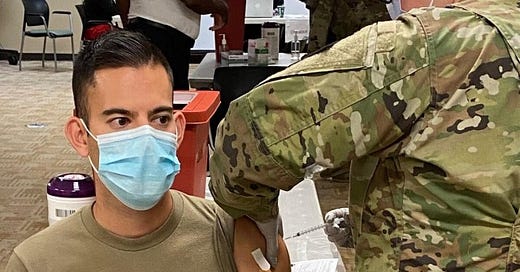Scuttlebutt. RUMINT. The Private News Network.
Soldiers have as many words for rumors as the Inuit do for snow. Rumors are such an ingrained part of soldier life the military’s independent news outlet, Stars and Stripes, ran a series of weekly articles penned by “The Rumor Doctor”.
But in the era of the Lance Corporal Underground, rumors spread faster than Coronavirus on a carrier.
Here are three reasons misinformation — and dis-information — are particularly worrying for service members awaiting the new Coronavirus vaccine.
Soldiers Love Medical Quackery
A popular myth once held saltpeter — a chemical the Army purportedly placed in soldiers’ food — prevented them from, erm, raising the flag at reville.
Saltpeter rumors are relatively harmless. Anti-vaccine conspiracies aren’t.
Today, one-third of troops have turned down the new COVID vaccine — especially younger service members, in line with national trends. Some are refusing the vaccine out of sheer spite — one military doctor quoted a soldier as saying, “The Army always tells me what to do. They gave me a choice, so I said ‘no’.”
Many, however, are saying no to vaccines based on conspiracy theories spread on social media. Although nearly every soldier carries a smartphone in their pocket, allowing them to access credible information from medical experts, most still get their news from peer networks and through Facebook. As one Fort Bragg spokesperson said, “Soldiers in the barracks aren’t listening to Dr. [Anthony] Fauci. Soldiers in the barracks are listening to soldiers in the barracks.”
Senior Leaders Can Be Super-Spreaders
Even senior leaders fall for hoaxes.
Sometimes it’s benign. In 2019, Army officials warned service members of a mysterious character named “Momo” who was purported to encourage kids to commit suicide via smartphone messages.
The warning — ironically, distributed on April 1 — was based on little more than an urban legend.
Studies suggest seniors are more likely to consume and share fake news than younger adults. That’s especially dangerous in the military, where rank and age go hand-in-hand, potentially turning senior leaders into super-spreaders of misinformation.
Case in point: Subordinates used the term “Flynn facts” to describe misinformation and rumors peddled by former DIA Chief and National Security Adviser Michael Flynn. (Flynn since pledged an oath to “Q”, the shadowy figure behind the QAnon conspiracy theory and has recently dabbled in anti-vaccine conspiracy theories)
Soldiers are Prime Targets for Foreign Disinformation
Decades of polling suggests the US military is the most trusted institution in the country. That makes service members prime targets for social media-based disinformation, especially from foreign governments.
Earlier this year, the US government identified 26 websites secretly run by Russian intelligence services. One website, “Veterans Today”, targeted US service members and veterans for nearly two decades with propaganda and conspiracy theories — including those surrounding the efficacy of Pfizer and Moderna vaccines.
US officials believe Russia is sowing doubt over Western-produced vaccines in an effort to promote Russia’s Sputnik V, a move some are calling “Sputnik diplomacy.”
Fighting Fake News
Social media misinformation — not unlike chain emails before it — works well because people tend to trust their friends.
Officials from Fort Bragg turned the tables on misinformation. A recent podcast featured junior soldiers — not generals — who had initially been skeptical about vaccines but were convinced to change their minds.
The podcast was downloaded over 90,000 times in ten days — ten times the usual rate. How’s that for a super-spreader?





